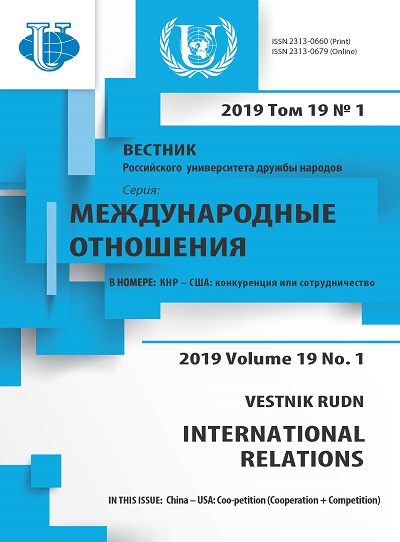BRICS Summit in Johannesburg: More Instruments and Fewer Decisions
- 作者: Ignatov A.A.1
-
隶属关系:
- The Russian Presidential Academy of National Economy and Public Administration
- 期: 卷 19, 编号 1 (2019): China — USA: Coo-petition (Cooperation + Competition)
- 页面: 89-99
- 栏目: 国际经济关系
- URL: https://journals.rudn.ru/international-relations/article/view/20854
- DOI: https://doi.org/10.22363/2313-0660-2019-19-1-89-99
- ID: 20854
如何引用文章
全文:
详细
This article presents an analysis of the outcomes of the tenth anniversary BRICS summit that took place in Johannesburg, South Africa, and the meetings of ministers of BRICS countries. The achievements of the ministerial meetings and the main summit were analyzed taking into account such parameters as the implementation of the priorities of the host country; ensuring continuity of the BRICS agenda; launching new initiatives and making decisions that are in line with the interests of the host country and BRICS partners. Beyond that, the article presents analysis of distribution of the functions of global governance (“Discussion”, “Decision making”, “Direction setting”, “Delivery”) and issues of the global governance by the number of symbols used in the texts of the Johannesburg declaration and the documents agreed during ministerial meetings. The author used the method of content analysis when reviewing the strategic documents of South Africa on issues of national development and the documents agreed during the ministerial meetings and the summit in Johannesburg, and the method of historical analysis when determining impact of South Africa on the BRICS agenda and success of the chairmanship. South Africa as the BRICS chair country preserved continuity over the key issues of the agenda (macroeconomic policy, cooperation in humanitarian sphere, etc.). Security issues were not fully developed, although they were put on the priority list by the chair country. Decisions made at the summit in Johannesburg and during the ministerial meetings result in creation of new working mechanisms (PartNIR, BRICS Vaccine Development and Research Center, etc.) that meet the current global challenges and match the interests of the parties. Nevertheless, the share of “Decision making” function decreased significantly against the background of the growing number of “Deliberation” function in the documents that were analyzed, which indicates a divergence of interests of the parties on a number of issues under discussion.
作者简介
Alexander Ignatov
The Russian Presidential Academy of National Economy and Public Administration
编辑信件的主要联系方式.
Email: ignatov-aa@ranepa.ru
Junior Researcher, Center for International Institutions Research (CIIR), Russian Presidential Academy of National Economy and Public Administration
参考
- Alden, C. & Schoeman, M. (2015). South Africa’s symbolic hegemony in Africa. International Politics, 52 (2), 239—254.
- Archangelskaya, A. & Kochetov, D. (2017). Dynamics of South Africa’s Foreign Policy in the Context of the Current Political Situation. Asia and Africa Today, 9, 36—42. (In Russian).
- Besada, H. & Tok, E. (2014). South Africa in the BRICS: Soft Power Balancing and Instrumentalization. Journal of International & Global Studies, 5 (2), 76—95.
- Kirton, J. (2012). G20 Governance for a Globalized World. Farham: Asgate.
- Landsberg, C. & Kondlo, K. (2007). South Africa and the ‘African Agenda’. Policy: Issues & Actors, 20 (13). URL: https://www.researchgate.net/publication/265078544_South_Africa_and_the_'African_Agenda' (accessed: 03.08.2018).
- Larionova, M. (2015). South Africa’s BRICS Presidency: Regional Power at the Helm of a Global Governance Forum. Vestnik RUDN. International Relations, 1, 125—134. (In Russian).
- Larionova, M.V., Rakhmangulov, M.R., Safonkina, E.A., Sakharov, A.G. & Shelepov, A.V. (2013). The Russian Federation G20 Presidency: in Pursuit of a Balance between Fiscal Consolidation and Sustainable Growth. International Organisations Research Journal (IORJ), 8 (4), 122—179. (In Russian).
- Larionova, M. (2012). Supply-Demand Model for Developing a Presidency Proposals for Reform Agenda and Priorities in Informal International Institutions (G20, G8, BRICS). International Organisations Research Journal (IORJ), 7 (4), 7—17. (In Russian).
- Makgetlaneng, S. (2015). The Theoretical Marginalization of South Africa’s Membership to BRICS by some South African Scholars: Key Issues. In: Africa’s Growing Role in World Politics. Ed. by T. Deych, A. Zhukov, O. Kulkova and E. Korendyasov. Moscow: Institute for African Studies Russian Academy of Sciences, p. 163—175.
- Neethling, T. (2017). South Africa’s Foreign Policy and the BRICS Formation: Reflections on the Quest for the ‘Right’ Economic-diplomatic Strategy. Insight on Africa, 9(1), 39—61. doi: 10.1177/0975087816674580.
- Petrakov, M. (2017). On Occasion of 25th Anniversary of Russia — South Africa Diplomatic Relations. International Affairs, 2, 19—33. (In Russian).
- Petropoulos, S. (2015). Opportunities, Challenges and Prospects of South Africa in the BRICS. In: The European Union and the BRICS: Complex Relations in the Era of Global Governance. Ed. by M. Rewizorski. Kolobrzeg: Springer International Publishing, 161—180.
- Safonkina, E. (2018). Chinese 2017 BRICS Presidency: expanding cooperation horizons. Vestnik RUDN. International Relations, 18 (2), 356—367. doi: 10.22363/2313-06602018-18-2-356-367. (In Russian).
- Sakharov, A. (2012) South African Republic. International Organisations Research Journal (IORJ), 4 (39), 171—183. (In Russian).
- Sharova, E. (2016). BRICS internal trade at the present time. National Strategy Issues, 2 (35), 150—174. (In Russian).
- Shelepov, A. (2016). Comparative Prospects of the New Development Bank and Asian Infrastructure Investment Bank. International Organisations Research Journal (IORJ), 11 (3), 51—67.
- Shubin, V. (2015). South Africa in the BRICS: Last but not Least. International Organisations Research Journal (IORJ), 10 (3), 51—67.
- Shubin, V. (2018) South Africa in BRICS: Last But Not Least. In: BRICS and the Global Governance. Ed. by J. Kirton, M. Larionova. London: Routledge, p. 223—242.
- Tella, O. (2017). South Africa in BRICS: The Regional’s Power’s Soft Power and Soft Balancing. Politikon, 44 (3), 387— 403. doi: 10.1080/02589346.2017.1295620.
- Yurtaev, V. (2016). BRICS: Cooperation Challeges in Africa. Vestnik RUDN. International Relations, 2, 191—202. (In Russian).
补充文件








